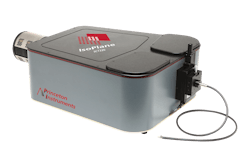Princeton Instruments imaging spectrograph eliminates astigmatism
The IsoPlane imaging spectrograph features a new optical design that eliminates the primary aberrations present in traditional imaging spectrographs. Features include a large f/4.6 aperture and a motorized triple-grating turret, as well as increased effective signal-to-noise ratio (SNR), reduced coma, and the elimination of astigmatism.
Princeton Instruments
Trenton, NJ
[email protected]
-----
PRESS RELEASE
Princeton Instruments Introduces the IsoPlane, a Revolutionary Aberration-Free Imaging Spectrograph
May 8, 2012 – San Jose, CA – The newest imaging spectrograph from Princeton Instruments, the IsoPlane SCT-320, will be unveiled at the Spring 2012 CLEO show in San Jose on Tuesday, May 8.
The IsoPlane™ (patent pending) features a revolutionary new optical design that eliminates the primary aberrations present in traditional imaging spectrographs. It produces images that are clearer and sharper across the focal plane than any comparable spectrograph on the market. As a result, more photons end up in spectral peaks, significantly increasing the effective signal-to-noise ratio (SNR).
Czerny-Turner imaging spectrographs are subject to imaging aberrations such as coma, astigmatism, and spherical aberration. Coma limits the spectral resolution of a spectrograph at most wavelengths, as it can be eliminated at only a single grating angle. The IsoPlane SCT-320 greatly reduces coma, thus preserving spectral resolution at all wavelengths.
Astigmatism appears as a vertical distortion of an image, limiting both spectral and spatial resolution. Astigmatism is completely eliminated in the IsoPlane SCT-320 spectrograph. This means that many more fibers in a bundle can be resolved, eliminating crosstalk in multichannel spectroscopy.
“The combination of outstanding imaging in a mirror-based instrument with a large f/4.6 aperture, a motorized triple-grating turret, and an ultrastable mechanical design is unique in the marketplace,” observes Ed Gooding, Ph.D., spectroscopy product manager at Princeton Instruments. “Together with Princeton Instruments’ industry-leading CCD, EMCCD, ICCD, and InGaAs cameras, as well as highly reflective mirror coatings from Acton Optics, the IsoPlane offers the best available performance in optical spectroscopy.”
Applications for the IsoPlane spectrograph include multichannel spectroscopy, microspectroscopy, Raman scattering, fluorescence, photoluminescence, laser-induced breakdown spectroscopy (LIBS), Fourier-domain spectroscopy, biomedical imaging, and most other spectroscopic imaging techniques.
About Princeton Instruments
Princeton Instruments designs and manufactures high-performance CCD, EMCCD, ICCD, and InGaAs cameras; spectrographs; and optics-based solutions for the scientific research, industrial imaging, and OEM communities. We take pride in partnering with our customers to solve their most challenging problems in unique, innovative ways. Princeton Instruments is a registered ISO 9001: 2008 company. For more information on Princeton Instruments products, please visit www.princetoninstruments.com.
Princeton Instruments, 3660 Quakerbridge Road, Trenton, NJ 08619 USA
-----
Subscribe now to Laser Focus World magazine; it's free!
